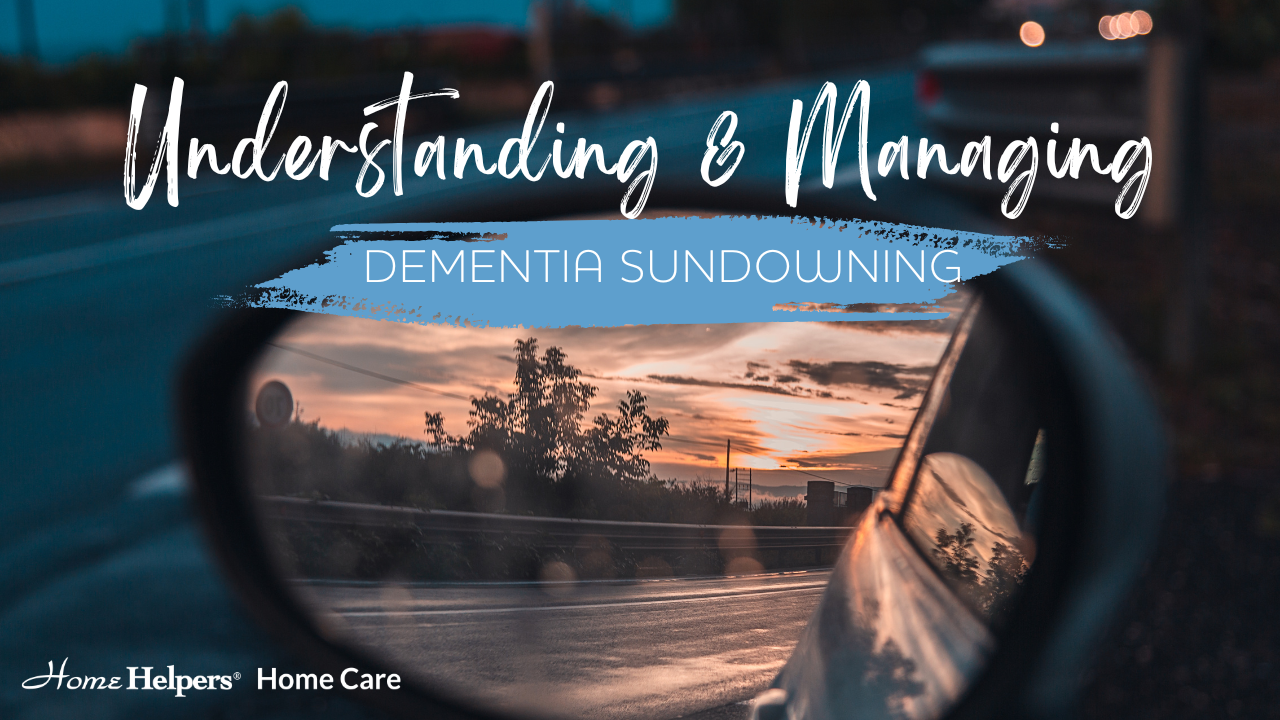Understanding and Managing Sundowning in Dementia Patients in Martinsburg and the Eastern Panhandle

Author: Home Helpers Martinsburg
Sundowning, also known as late-day confusion, is a common and often distressing phenomenon in individuals with dementia. Families across Martinsburg, Inwood, Falling Waters, and the greater Eastern Panhandle of West Virginia often notice loved ones becoming more agitated, confused, or anxious in the late afternoon and evening hours. Understanding and managing sundowning is essential for improving quality of life—for both the person experiencing it and the caregiver supporting them.
Here’s an in-depth look at sundowning and how families in our region can manage it more effectively.
1. Understanding Sundowning
Sundowning typically occurs in the late afternoon and evening, though its exact cause is not fully understood. Experts believe it's linked to changes in the brain that disrupt the body's internal clock (circadian rhythm), making it harder for people with dementia to interpret cues about time and place.
Fatigue, low lighting, overstimulation, and difficulty separating dreams from reality can make symptoms worse. Caregivers in the Martinsburg area often report that even familiar settings can become unsettling during this time of day.
2. Recognizing Symptoms of Sundowning
Common symptoms include:
- Increased Confusion – Struggling with communication or misinterpreting surroundings
- Agitation and Irritability – Pacing, fidgeting, or repeating questions
- Mood Swings – Sudden shifts from calm to frustration or anxiety
- Hallucinations or Delusions – Believing someone is in the house or misidentifying loved ones
- Sleep Disturbances – Restlessness at night, wandering, or refusal to sleep
Being able to recognize these signs early allows caregivers to adjust care plans and prevent escalation.
3. Strategies to Manage Sundowning
Establish a Consistent Routine
Families in Martinsburg and nearby communities often find comfort in structure. A regular schedule for meals, bathing, and bedtime creates predictability and eases anxiety. Consider:
- Quiet activities in the late afternoon (puzzles, folding towels, or listening to music)
- Avoiding naps too close to evening
- Keeping evening routines calm and familiar
Optimize the Environment
Environmental adjustments can make a big difference:
- Turn on lights before sunset to reduce shadows
- Use nightlights in hallways and bathrooms
- Keep rooms decluttered and quiet
A well-lit, calming space helps ease disorientation and discourages agitation.
Promote Physical and Mental Activity
Physical movement during the day improves sleep and overall mood:
- A walk in War Memorial Park or gentle stretching indoors
- Sorting items or helping with simple household tasks
- Listening to familiar music or looking through photo albums
Avoid overstimulation but keep the mind and body gently engaged.
Monitor Diet and Hydration
In the late afternoon, avoid:
- Caffeinated drinks
- Sugary snacks or processed foods
Encourage hydration throughout the day and serve a light, balanced evening meal to prevent discomfort at night.
Manage Sleep Patterns
Establish a regular bedtime and waking time, and limit long naps. Calming bedtime routines—like a warm bath or soft music—can signal it’s time to rest. Avoid screen time in the evening.
Provide Reassurance and Comfort
Reassurance can be as simple as:
- Sitting quietly and holding hands
- Speaking in a soothing tone
- Providing a cozy blanket or comforting object
During difficult moments, your calm presence can provide the stability your loved one needs.
4. When to Seek Professional Help
If sundowning symptoms worsen or become dangerous, it may be time to consult a healthcare provider. In Martinsburg and the surrounding area, local clinics and memory care specialists can help:
- Identify underlying conditions (like urinary infections or medication side effects)
- Adjust medications if necessary
- Provide caregiver training and support
Working with professionals ensures your care plan evolves with your loved one’s needs.
5. How Home Helpers Home Care of Martinsburg Can Support You
At Home Helpers Home Care of Martinsburg, we understand how overwhelming sundowning can be for families. Our trained Caregivers help ease the burden by delivering personalized care that adapts to your loved one’s routines and symptoms.
We offer:
- Personal Care – Assistance with bathing, dressing, and evening routines
- Environment Optimization – Keeping spaces well-lit and calm during late-day hours
- Structured Activities – Thoughtful engagement to reduce restlessness
- Sleep Support – Gentle evening routines to encourage better rest
- Emotional Reassurance – Familiar faces offering comfort and routine
We proudly support families throughout Martinsburg, Inwood, Falling Waters, Hedgesville, and surrounding Eastern Panhandle communities.
Conclusion
Sundowning can be one of the more difficult aspects of dementia care—but it’s manageable with the right strategies and support. By building a stable routine, maintaining a calming environment, and reaching out for help when needed, caregivers can reduce distress and help their loved ones feel more secure.
📞 Call Home Helpers Home Care of Martinsburg at (304) 433-8000 to learn more about how we can support your family with compassionate dementia care.
Sources:
- Alzheimer’s Association. (2023). Sundowning: Late-Day Confusion – www.alz.org
- National Institute on Aging. (2023). Managing Sleep Problems in Alzheimer’s Disease – www.nia.nih.gov
Mayo Clinic. (2023). Alzheimer's Sundowning: Tips for Coping – www.mayoclinic.org
